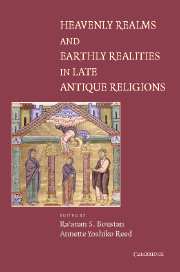Book contents
- Frontmatter
- Contents
- Preface
- List of Contributors
- Introduction: “In Heaven as It Is on Earth”
- PART ONE BETWEEN EARTH AND HEAVEN
- 1 The Bridge and the Ladder: Narrow Passages in Late Antique Visions
- 2 “Heavenly Steps”: Manilius 4.119–121 and Its Background
- 3 Heavenly Ascent, Angelic Descent, and the Transmission of Knowledge in 1 Enoch 6–16
- 4 “Connecting Heaven and Earth”: The Function of the Hymns in Revelation 4–5
- 5 Working Overtime in the Afterlife; or, No Rest for the Virtuous
- PART TWO INSTITUTIONALIZING HEAVEN
- PART THREE TRADITION AND INNOVATION
- Select Bibliography
- Index
5 - Working Overtime in the Afterlife; or, No Rest for the Virtuous
Published online by Cambridge University Press: 14 July 2009
- Frontmatter
- Contents
- Preface
- List of Contributors
- Introduction: “In Heaven as It Is on Earth”
- PART ONE BETWEEN EARTH AND HEAVEN
- 1 The Bridge and the Ladder: Narrow Passages in Late Antique Visions
- 2 “Heavenly Steps”: Manilius 4.119–121 and Its Background
- 3 Heavenly Ascent, Angelic Descent, and the Transmission of Knowledge in 1 Enoch 6–16
- 4 “Connecting Heaven and Earth”: The Function of the Hymns in Revelation 4–5
- 5 Working Overtime in the Afterlife; or, No Rest for the Virtuous
- PART TWO INSTITUTIONALIZING HEAVEN
- PART THREE TRADITION AND INNOVATION
- Select Bibliography
- Index
Summary
One of the most interesting things about eschatology is the fact that so many cultures have developed the idea of postmortem reward and punishment. It is not inevitable. In early Greek sources, for example, virtually everyone gets the same deal after death, whoever they were while alive and whatever they did. Even more to the extreme, some strains of early Judaism preached that there was no afterlife at all. One simply died and that was the end of it. But in many more cases, the afterlife becomes a place where one gets what one deserves. For instance, in the Apocalypse of Paul, it is the souls of only virgins who enter the City of Christ, the most desirable realm of the afterlife, whereas even the most virtuous of married souls receive only a lesser reward in the Land of Promise instead (Apoc. Paul 22). In contrast, according to some strains of ancient Greek eschatological belief, the souls of virgins are forced to wander unhappily between the worlds of the living and the dead forever, venting their frustrations by killing the babies of women who managed to marry. Obviously, you can tell a lot about what a culture values and admires and, conversely, what it devalues and condemns, by studying who gets rewarded in the afterlife and who gets punished.
Equally fascinating is the nature of the rewards and punishments themselves. The logic underlying some of them is quite transparent, to be sure.
- Type
- Chapter
- Information
- Publisher: Cambridge University PressPrint publication year: 2004



